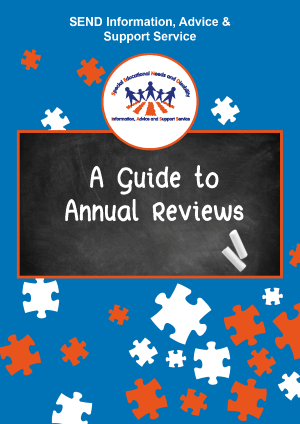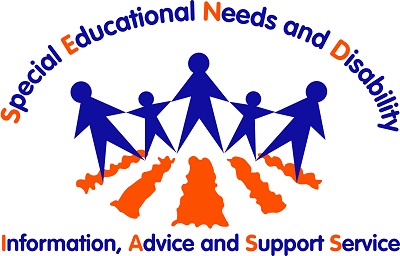EHCP: Annual Reviews

What is the annual review?
The Education Health and Care Plan (EHCP) is a legal document and the Annual Review of the EHCP is part of that legal process. The annual review of an EHC plan will look at your child or young person’s progress towards their outcomes and the support they need to achieve them. The Children and Families Act 2014 states that your child’s EHC plan, must be reviewed at least once a year (if your child is under five years old, it suggests reviews should take place every 3 - 6 months ).
The information contained on these pages is taken from the Special Educational Needs and Disability (SEND) Code of Practice: 0 - 25 years (2015) and Coventry's SEND Local Offer.
The Annual Review will:
- bring together your views and those of your child or young person, along with the Local Authority, the education setting and all the professionals who help your child
- check your child’s progress against the outcomes specified in the EHC plan and longer term aspirations
- review the short-term targets and set new ones where necessary
- consider any further action required and if so, who will be responsible
- decide whether the EHC plan needs amending
An early annual review can be also arranged if there has been a change in your child / young person’s needs or if the provision in the EHC Plan is no longer meeting their needs.
What happens before the Annual Review Meeting?
The educational setting will request a report for the annual review from all the professionals involved with your child / young person. They should also ask the parent or young person to contribute their views, wishes and feelings. An invitation to the annual review meeting should be sent to everyone involved, together with a copy of all the reports gathered. You must be given at least two weeks’ notice of the date of the review meeting.
How can I be involved?
You and your child’s views are very important and the following may be of help in the process:
- you may wish to look at the special educational, health and social care needs (section B, C and D) and provisions (section F, G and H) set out in the plan. Make a note of anything that is missing or in need of updating.
- Make a list of anything you would like to share at the meeting, and any questions you may want to ask
- according to your child’s age and ability, you may wish to talk to your child and find out what he/she thinks about their progress.
- The education setting should also provide your child/young person with the opportunity to record his/her own views, and encourage them to take an active role in the annual review process
If you wish, you can use the form called ‘Your Part in the Annual Review - Parents’/Carers’ Report and Advice Form’ to assist you with writing down your and your child’s views before the review meeting. You can get a copy from your child’s setting or it can be downloaded from this website
If you are having difficulty in completing the form, please contact SEND Information, Advice and Support Service.
The Annual Review meeting
The meeting will normally take place at your child’s education setting and led by the SENCO, Head teacher or another nominated member of staff. Those present will be asked to comment on your child or young person’s progress and should include their achievements and any difficulties. The meeting can also include any requests for a Personal Budget or review any existing Personal Budget and direct payment arrangements.
TOP TIPS!
- You can take a friend or family member to the meeting
- Make sure that you are introduced to anyone you do not know at the meeting
- If any reports are handed out at the meeting, you can ask for time to read them
The person leading the meeting should:
- Make sure parents/carers and the child/young person are fully engaged in this process
- Focus on your child/young person’s progress towards the outcomes in section E of the EHCP
- Agree any changes to support that may be required to meet the outcomes or change to the outcomes themselves
- Include conversations and details about transition phases (when relevant)
Ensure all outcomes are SMART. This will help when reviewing them in future reviews of the EHCP.
S – Specific
M – Measurable
A – Achievable
R – Realistic
T – Time Related
After the meeting
The school (or, if your child attends another education setting, the local authority) must prepare and send a report of the meeting to everyone who was invited within two weeks of the meeting. The report must set out any changes that have been suggested. Once the Local Authority have received the report, it must decide whether to:
- Keep the plan as it is
- Amend (Change) it
- Cease to maintain it
The Local Authority must send you and the education setting their decision within four weeks of the review meeting. In each case, whatever the decision (even if the Local Authority decides to do nothing) you have the right to challenge that decision including the right of appeal to the First-Tier Tribunal for SEN and Disability.
What happens next?
1. Keeping the EHC plan as it is
If the Local Authority have decided there should be no change to the EHC Plan, they must send a letter explaining this.
2. Amending (changing) the EHC plan
If the Local Authority amend the plan, they must do so without delay and send you a copy of the existing plan and a notice which sets out the proposed changes. You will have 15 days to respond. If you do not agree with the changes, you can discuss this with your EHC Plan Co-ordinator, including requesting a change to placement in section I of the EHC Plan.
The local authority must issue an amended final plan within 8 weeks of sending the proposed changes to you. They must also advise you of:
- your right to appeal against the content of the plan to the First-tier Tribunal, SEN and Disability
- the requirement for you to consider mediation should you wish to appeal
- disagreement resolution services and the availability of information, advice and support
3. Ceasing an EHC plan
A local authority may cease to maintain an EHC plan only if:
- it determines that it is no longer necessary for the child / young person to have a plan i.e. they no longer require the special educational provision in the plan and/or they have met all of their outcomes listed in section E of the plan
- if it is no longer responsible for the child or young person i.e. they have moved out of the area or they have left education or training
Re-assessments of EHC plans
An amendment to the EHC plan would be for minor or specific changes in the child’s circumstances. However, if a child’s needs change significantly parents/carers, the young person or the education setting may request a re-assessment of the EHC plan. In this case, the LA must carry out a re-assessment if more than 6 months have passed since the last EHC needs assessment was conducted. The LA can also decide to start a re-assessment.
Re-assessments must follow the same process as for the first EHC needs assessment and drawing up of the EHC plan, with the same timescales and rights of appeal for the child’s parent or the young person.
Transfer between phases of education
For transfers to primary and secondary schools, the review and any amendments to the EHC Plan must be completed by 15 February in the calendar year of the transfer. The EHC Plan must name the school that your child will be attending.
If your child is moving from secondary school to a post 16 education or apprenticeship, the review and any changes to the plan - including naming the setting, must be completed by 31 March in the calendar year of transfer.
There is further information on pupils moving between phases of education on the Coventry City Council website. You can find this using the link https://www.coventry.gov.uk/coventrys-special-educational-needs-disability-send-local-offer/school-education-children-special-education-needs-disabilities/8
Preparing for adulthood in reviews
From Year 9 and onwards, all reviews must focus on preparing for adulthood, including the areas of employment, good health, independent living and participation in society. This transition planning must be built into the EHC plan and, where relevant, should include effective planning for young people moving from children’s to adult health and social care services.
At the review meetings, it will be important to record the views, wishes and feelings of the young person. It would be useful to invite staff from post-16 institutions, especially from any settings where your young person has expressed an interest in attending.
Preparing for Adulthood have also produced a guide to Annual Reviews for those young people in Year 9 and above. It offers suggested questions and checklists to help you prepare for the review.
Post-16
As a child reaches the end of the academic year in which they turn 16 years old, some rights to participate in decision-making about EHC plans transfer from the parent to the young person, subject to their capacity to do so. Tthis is set out in the Mental Capacity Act 2005. Parents of young people can still access information, advice and support with, or on behalf of, the young person subject to their agreement.
The annual review process should be used to consider whether special educational provision provided through an EHC plan, will continue to enable young people to progress towards agreed outcomes.
Post-19
When deciding whether a young person aged 19 or over no longer needs the special educational provision specified in the EHC plan, a local authority must take account of whether the education or training outcomes specified in the EHC plan have been achieved. Local authorities must not cease to maintain the EHC plan simply because the young person is aged 19 or over.
Where an EHC plan will still be maintained for a young person aged 19 or over, it must continue to be reviewed at least annually. The plan must continue to contain outcomes which should enable the young person to complete their education and training successfully and so move on to the next stage of their lives. This could include employment or higher education and independent living.
Local authorities should ensure that young people are given clear information about what support they can receive, including information about continuing study in adult or higher education, and support for health and social care when their plan ceases.

